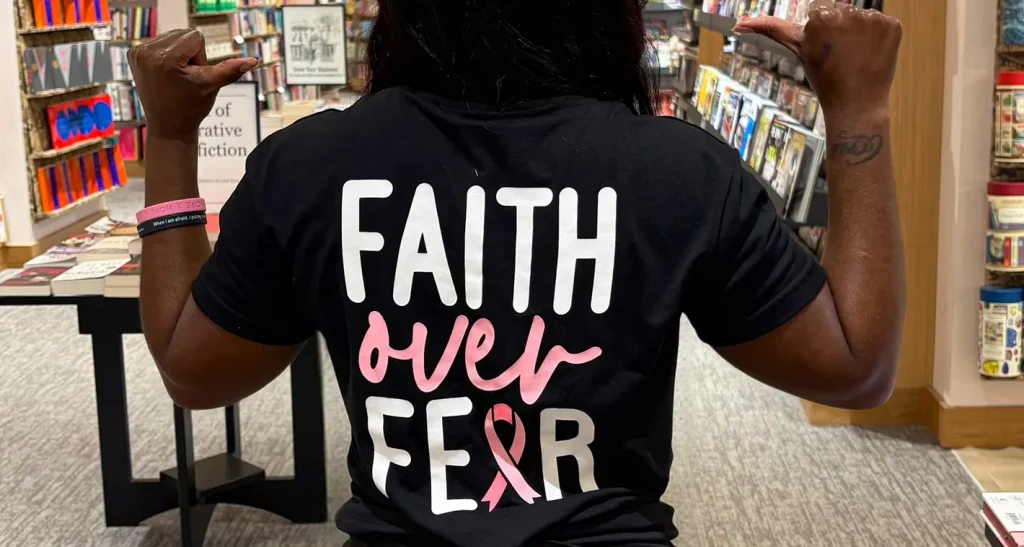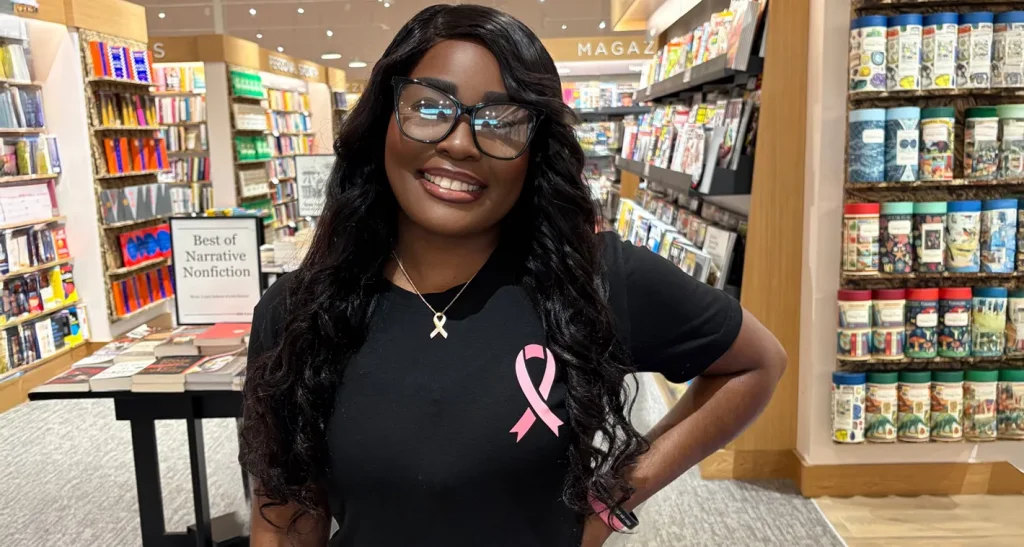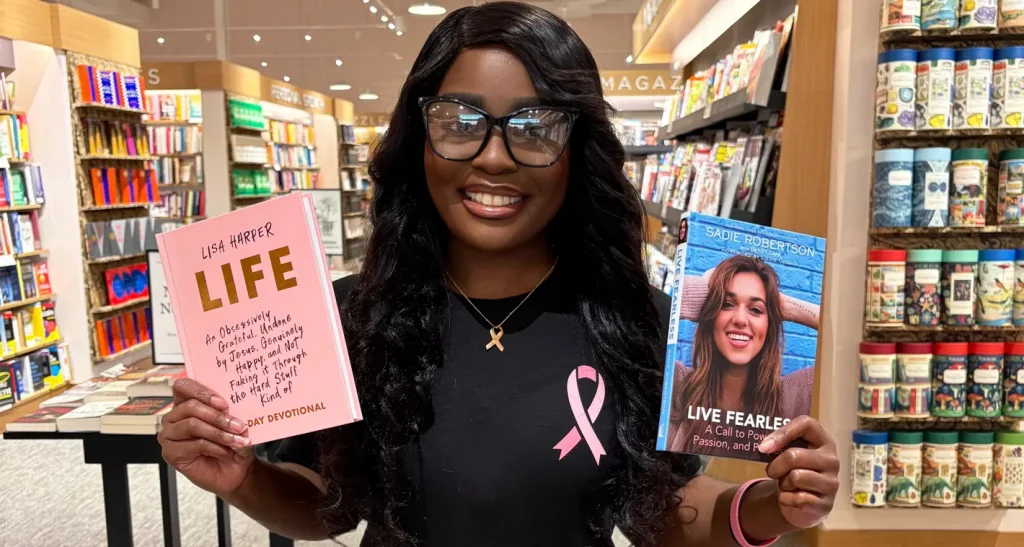A WARRIOR’S TESTIMONY

In May 2025, I was diagnosed with stage 2A invasive mucinous carcinoma, a rare form of breast cancer. I never imagined this would be my story. It doesn’t run in my family, and my symptoms weren’t the typical ones you hear about. From that day forward, everything changed. I’ve learned to trust my body, to advocate for myself, and to lean harder than ever on my faith. This journey has been life-changing.
How to prevent breast cancer (or catch it early)?
You can’t always prevent breast cancer, but you can pay attention to your body. Know your normal and don’t dismiss changes. I found a lump, but because it didn’t fit the “typical” symptoms, I didn’t think much of it. Cancer is not always predictable.
That’s why self-checks, trusting your instincts, and speaking up until you’re heard are so important. If something feels suspicious or just doesn’t feel right, advocate for yourself and push for screenings. Early detection and second opinions can save your life.
Advice on how to face the news.
When you first hear the words “you have breast cancer,” your world stops. For me, it was shock at first, then grief. But I learned not to live in that place too long. I leaned firmly on God and reminded myself that my children needed their strong mom. That’s when my mindset shifted.
My advice is this: let yourself feel it, but then ground yourself. Lean on your faith, your loved ones, or whatever gives you strength. Take it one step at a time. Don’t try to solve everything in that moment; just focus on your next step forward.

Where to find information.
When you’re first diagnosed with breast cancer, it can feel overwhelming because you don’t even know where to start. For me, having a nurse navigator was a lifeline. She helped me understand what my diagnosis meant and walked me through those first steps when everything felt confusing.
I also immediately joined a cancer support group so I could connect with people who had been there before me. Later, I joined Facebook groups and made friends with women who had similar diagnoses, people who truly understood what I was going through. That gave me not just information, but encouragement and real-life advice you can’t always get from doctors.
My advice: lean on your medical team, but also seek out community. Sometimes the most helpful information comes from others walking the same road.
Where to find cancer support.
Support looked different than I expected. My foundation was God and my faith, and my therapist helped me process the weight of everything. My kids were my anchor; they kept me going on the hardest days. My best friend reminded me every day I was going to survive!
I had a few friends and family, but the strongest support came from other places. My boss and colleagues encouraged me virtually and stepped up when I needed them most. Some of the deepest support came from my breast cancer friends, women I met through groups who were walking the same journey. They understood the daily challenges of chemo, surgery, recovery, and the emotions that come with it.
The truth is, support doesn’t always look like a huge crowd. Sometimes it’s a small circle of the right people showing up consistently, and that’s more than enough.

How to announce it to loved ones.
Getting a breast cancer diagnosis is overwhelming, and sharing it with others can feel just as hard. In the beginning I was in shock and unsure how to even put it into words. Over time, I learned to give myself permission to share at my own pace and in my own way.
My advice is don’t feel pressured to make a big announcement or tell everyone at once. Start with the people you feel safest with, then expand your circle when you’re ready. This is your story; you get to decide when and how to tell it.
Something that helped me feel better during the process.
My faith was my foundation; I leaned on God, listened to sermons, and filled my days with books that spoke to strength and peace. Spending time in the bookstore gave me comfort, because I could literally choose words that built me up and reminded me to live with faith over fear.
My children kept me laughing and reminded me of my “why.” I journaled to release my emotions, played classical music to calm my spirit, and did my makeup when I wanted to feel like myself, and yes, even shopping trips gave me a lift. I kept myself busy on purpose, because I knew sitting still too long could let fear take over. I also reminded myself…I am not my diagnosis!
That balance, finding stillness with God and also choosing activity, is what kept me grounded.

Advice to families and friends supporting someone with breast cancer.
The biggest thing is just showing up. Don’t overthink what to say or do. Sometimes it’s not about the perfect words; it’s about presence. A quick message, a prayer, an act of kindness—those small gestures carry so much weight.
Pop up, check in, send flowers, or do something thoughtful to show you care. Breast cancer isn’t only physically draining; it’s mentally exhausting too. Knowing someone is there for you, even in small ways, makes a huge difference. Your presence can give them strength on the days they feel weakest.
What was your biggest fear?
My biggest fear at first was the surgery itself. The idea of losing a part of my body and not knowing how recovery would feel was overwhelming. Then came chemo, something I never imagined myself going through. The thought of how my body would handle it, the side effects, and how it would change me was terrifying. After that, my fear shifted to recurrence, wondering if the cancer would come back and if I’d ever feel safe again.
Everything also moved so fast after my diagnosis. It felt like one decision after another—surgery, chemo, treatment plans, and next steps—and I was scared of making the wrong choice. But I leaned on God with every decision. I trusted that if I kept Him at the center, He would guide me through, and that gave me peace even when the fear was loud.





